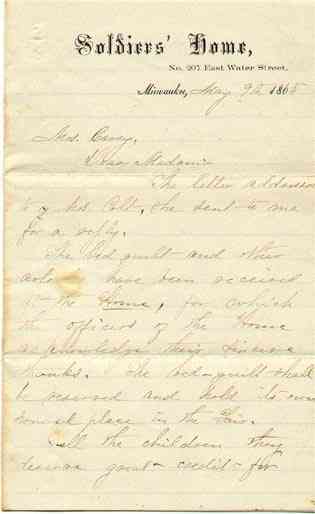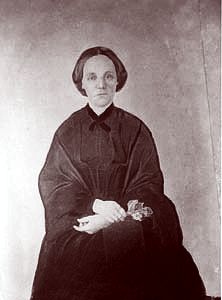| Caroline
Eleanor Baker or Caroline Eleanor Cullum-Sample-Baker-Walker-Carey Mr. Bill Jackson, and his collection From the 8th Wis.
Thanks to the incredible generosity of Mr. Bill
Jackson, his collection of correspondence between his Great Great
Grandfather, Horace Mann Baker and |
|
| Caroline Eleanor
Cullum was born June 5th, 1821, in Stonington, Connecticut. Her father, John
Henry Cullum, a sea captain; grandson of Arthur Cullum of Bury St.
Edmonds, England. His people were exiled to Nova Scotia after the
revolution because of their loyalty to the crown.
Her mother, Lucy Ann Brewster was the daughter of Benjamin Franklin Brewster, six generations away from the crusty old puritan, Elder William Brewster of Mayflower fame. John Henry died of a sunstroke at New Orleans in 1824, while supervising the unloading of cargo, leaving Lucy Ann a widow with Caroline barely three years old and John Henry Junior almost one. Benjamin Franklin Brewster had patented an island on the Allegheny river ten miles up from Pittsburg, Pennsylvania. To this island home he brought his daughter and grandchildren. It was on Brewster Island that Caroline spent her early years in happy solitude. With her brother as her playmate and her mother as her teacher her world was the freedom of the island. She loved to read and there were lots of books. Caroline was growing into a beautiful young lady. When Caroline was eleven years old, the island was overrun, and occupied by river pirates. They allowed the family the sanctuary of the home, but that sanctuary was tenuous at best. Often the budding maturity of Caroline would catch the leering eye of one of the crew and Lucy Ann feared for their safety. The decision was made to abandon the island, so one dark night the family, with such of their belongings as they could gather together, climbed into one of Grandfather Ben's river boats and floated quietly away and down the Allegany. As Ben met and talked to people along the river, he began to hear more and more about Texas. It seemed like a promising place to start life over. He learned that, if he qualified, he would be given a league (4,428 acres) and a labor (177, tillable) of land. As they continued down river the Allegheny turned into the Ohio. They landed in Smithland, Kentucky where Lucy and the children took temporary lodging. Grandfather Ben continued to Texas to look into prospects for establishing the family there. Caroline was almost fifteen when Ben returned. He had good news and bad news. The good news was that he did qualify for the land grant. The bad news was that Texas was in the midst of a rebellion to free itself from Mexico. To get there by land meant crossing the land of the disputed eastern boundary. There was a no-man's land strip between the United States and Texas inhabited by every kind of brigand, murderer, thief, and cut throat who had something that they were running away from back home. The decision was made to continue on down the Mississippi to New Orleans, thus giving Lucy Ann a chance to tend to some of her husband's unfinished business. Upon reaching New Orleans, Ben sold his river boat and they boarded another ship to sail across the Gulf of Mexico to Galveston. Texas had just suffered the defeats at the Alamo and at Goliad. Sam Huston had finally won a resounding victory at Jan Jaciento and Santa Anna was being held prisoner on a ship nearby when Caroline caught her first sight of the Texas she had heard so much about. Caroline's first home in Texas was at Mina, now Bastrop. It was on the edge of Austin's colony. There she waited with her mother and brother while grandfather Ben went north to look for his land. Mina was on a road much traveled by men who had fought in the revolution and were struggling to form a government for the new nation. Lucy Ann's door was always open to them and the coffee pot was always on. One young lawyer, David Sample, who had been elected Representative from Red River county, started going out of his way so that he could stop for coffee poured from the hand of saucy little Caroline. The attachment grew into a romance which was interrupted when grandfather Ben returned and moved his family to his new land two miles south of Clarksville. This posed no real problem for the young lovers because Clarksville was the county seat of the county which David represented David had a good friend, Hiram Baker, who had ridden to Texas with Sam Houston. Hiram was also a lawyer, his business was to settle Indian Headrights in the vicinity. David and Hiram shared Sam Houston's belief that the future of Texas would best be served by becoming a part of the United States. One drawback was the uncertainty of the Boundaries, especially the neutral zone to the east. Every one agreed that the line needed to be surveyed, but no one wanted the job. It was the time of year that yellow fever was rampant along the Sabine bottoms. Finally David made up his mind that he would give up his position as Representative and take on the job as surveying the eastern boundary line. There was one thing he wanted to do first, however. He bought a strong new house and headed north to Clarksville to claim his bride. Caroline may have been only fifteen, but she knew that David was her own true love. Despite the advice of her mother and the misgivings of her grandfather Ben, a hasty wedding was performed and the new bride seated herself behind the happy groom and they set out across east Texas. David was well known by all the plantation owners in east Texas. All along the way, they were offered hospitality and were entertained with one plantation trying to outdo the other. There were parties, banquets, and balls. Finally, however, they began to enter the bottom lands of the Sabine. It was hot and sultry; mosquitoes brought the threat of yellow fever more prevalent and hospitality harder to find. Caroline's youth and love made the whole thing seem like an adventure. They camped along the work site, and Caroline's happiness was complete when she realized that she was carrying David's child. Caroline's sixteenth birthday was marred by the fact that David was not acting normal. He complained of a headache and when Caroline felt of him her hand confirmed the fear that he was coming down with the fever. Caroline realized that she must get David back to Clarksville, and finally persuaded him to leave the project for others to finish. David's condition grew steadily worse as they retraced their earlier route back home. After many days they reached the home of Lucy Ann but David's strength was almost gone. He lived but a few days after returning to Clarksville and died in Caroline's arms. Caroline stumble from the room and blinded by tears, started down the stairs. Exhausted from her long ordeal. She missed the first step and tumbled all the way to the bottom. Her baby, a little boy, was aborted and David Sample was buried in the family grave yard with his son in his arms. Knowing that he was not going to survive, David had asked his old friend, Hiram Baker, to care for his young wife. At first Hiram did this out of respect for his friend. Soon, however, he realized that pity was not the only reason that he spent so much time on Caroline's behalf. Respect for her deep grief caused him to be discreet about his feeling. He had heard Caroline say that David was the love of her life and that she could never love again. Hiram was a lawyer, a congregational minister and a professor at McKenzie College of Clarksville. He had a secure position with the new government of Texas as an Indian agent. He was morally sound as attested to by the statement signed by two select men from Moscow, Maine, his home town. A fine looking fellow, he did seem to be somewhat fiddle footed as evidenced by the fact that he had traveled from Moscow, Maine to Fort Dearborn, now Chicago. He stayed there only long enough to obtain a teacher's certificate, hand written and signed by the Chairman of the Board of Education of Chicago. His wanderlust had finally led him to Texas. As time dulled Caroline's grief, Hiram dared to declare his love. At first, she was quick to refuse, but Hiram was a persistent suitor. He represented security. She did not doubt that he loved her and he finally persuaded her that in time she would learn to love him. It was with a more mature emotion that Caroline finally agreed to marry Hiram than she had felt when she accepted David Sample. Caroline's adventures did not end here. Hiram managed to curb his wanderlust long enough to father three children; Horace, born in the Republic of Texas, Chauncy (Chan), and Baby Lucy, before the lure of gold in California became too strong for him to resist. With a hug and a kiss, and a promise of wealth that would be theirs when he returned, he bade his family goodbye. He made Caroline promise that if the bad feeling between North and South would develop into a shooting war, she should make her way north to his uncle Perry in Wisconsin and put the two boys in the Northern army. Caroline waited in vain, because Hiram died in the gold fields and was buried in Grass Valley, California (1849). She was left with no wealth, no riches, only with a promise that seemed her destiny to carry out as the relations between North and South become steadily more hostile. More to follow.... |
|
|
Soldier's Home Letters Memphis, Tenn., Feb., 13,
1865 |
|

example of the Soldier's Home stationery |
Soldiers' Home |
|
Milwaukee, In answer to your
kind and welcom letter I hasten to answer every important inquiry which
it contains and I think from actual experience I can do so to the
satisfaction of all concerned. And what I have to say is the experience
of a soldier who has been in the Army a good share of the time since
Aug. '61 and I here say that as far as my knowledge is concerned of the
facts in reference to the Disposition of thousands of delicies and
Comforts in the shape of Pies, Cakes, fruits and confections of every
description I believe there has not been one article in a hundred but
what has been received and enjoyed by those for whom they were designed
and I while I believe that the present Christian Commission has the
right to claim all the force of truth set forth in the forgoing
statements. I cannot deprive myself the privilege of expressing my
heartfelt gratitude for those kindnesses that I together with many of my
comrades enjoyed even so far back as the Summer and fall of '63 and
among those Angels of mercy I cannot fail to mention the name of Mrs.
Brookins of Wauwatoosa. God Bless her together with all those who were
engaged with her in the truly Christian Phylanthprie Efforts to benefit
the patriot soldiers. Soldier's Home Dear Mrs. Carey, Soldier's Home Soldiers' Home |
|
